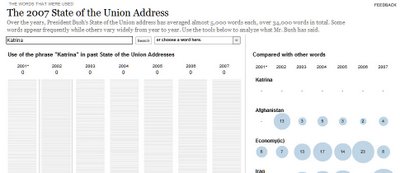"it's not a simple, you know, one-bullet-point plan." Tony SnowQ You don't have any other details?
MR. SNOW: No.
Q How about how the President found out, et cetera?
MR. SNOW: You know what, stupid me, I forgot to do the process stuff. We'll try to find out.
---
I haven't looked at it; I don't know if the President has looked at it; I haven't talked to our Leg Affairs people about it. Give us a little time to take a look.
---
There is not going to be sort of a roster of specifics...
---
I'm not going to get into the business of preemptively characterizing something that we have not released in full detail.
---
Our ground rules are, we don't talk about it, so I don't talk about it.
Q I'll try and make you talk about it.
MR. SNOW: You'll fail.
----
the President has made it clear that he's going to have exchanges of views, but I'm not taking you in the room with them.
(Cell phone rings.) (Laughter.) Does Martha have a hip-hop ring tone? (Laughter.) Play that funky music, white girl. (Laughter.)
---
what singular group or person has the most influence on the President in his thinking on the way forward?
MR. SNOW: The second question is unanswerable.
---
could you tell us how much it will cost a month to fight a war in Iraq under the President's new plan? Because I understand there's going to be a lot of initiatives to put Iraqis to work, to try to shore up --
MR. SNOW: It's a great way of trying to get me to divulge details before their time, so, no. But we'll get back to you.
---
MR. SNOW: Okay, you want me, without details, to answer a question, will this move the street. You've got to be kidding me.
Q -- go into details.
MR. SNOW: Well, I know, and you know what, when we're ready to share the details, we'll share the details. I can't do it right now.
---
MR. SNOW: Again, wait until tomorrow night, and you'll have an answer.
Q Is he going to address the Iraqi people directly?
---
MR. SNOW: As I said, just wait.
MR. SNOW: As I said, on the procedural matters, I will allow you to wait and see what the President says tomorrow.
We need a sock puppet for this now---
Q -- and from Texas -- he's also from Texas, -- will hold a news conference about the 250,000 petitions asking presidential pardon for U.S. Border Patrolmen facing 10 year prison sentences because they shot a fleeing Mexican drug-pusher in his buttocks. Does the White House believe that the White House believe that the President's fellow Texan and fellow Republican was wrong to do this?
MR. SNOW: I think -- you know Les, I thought I brought my points on that -- why don't you ask that -- because
that will be entertaining to do tomorrow, and I want to get back to you on it. I thought I had packed that with my materials today, but I didn't.
---
Q The AP reports that
the U.S. Army sent letters to 75 officers who were killed in action encouraging them to reconsider -- to consider returning to active duty. And while General Richard Cody has apologized for this computer error, there's no report of anyone being disciplined for this. And my question: What does the Commander-in-Chief of the Army have to say about this horrendous error, and about what else such computer errors could do?
MR. SNOW: I'd refer that to the Pentagon, Les.
---
Q What about the change in interpreting entrance records to the White House as being the property of the White House and not of the Secret Service?
MR. SNOW: That is a fairly abstruse issue, and I will see if I can get you guidance from the Office of Legal Counsel. I don't want to tap dance around that. I'll try and get you a straight answer.
(uncontrollable laughter and thunderous applause)
---










